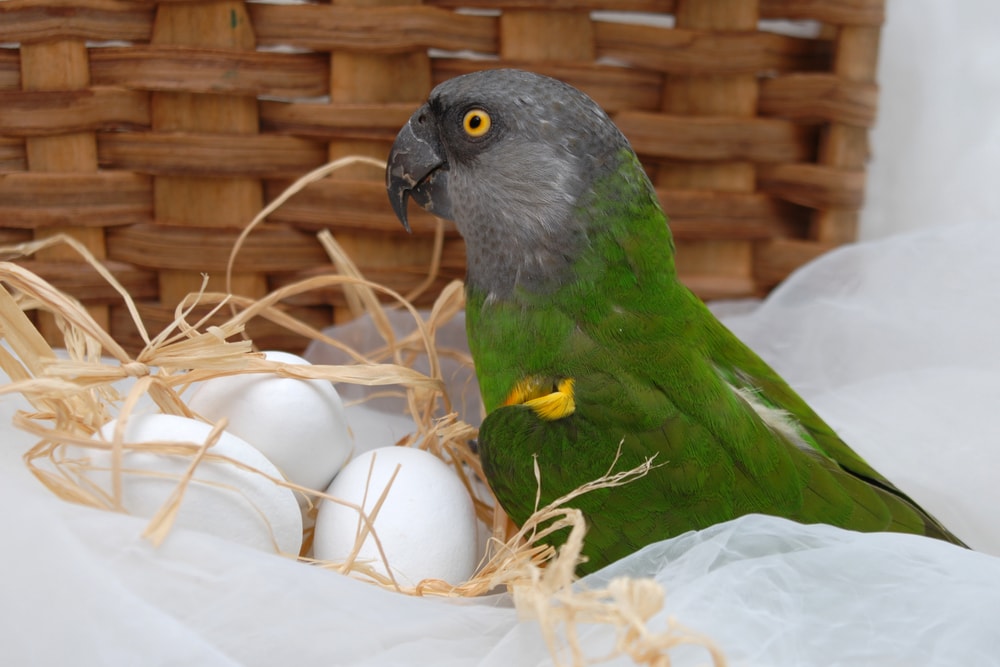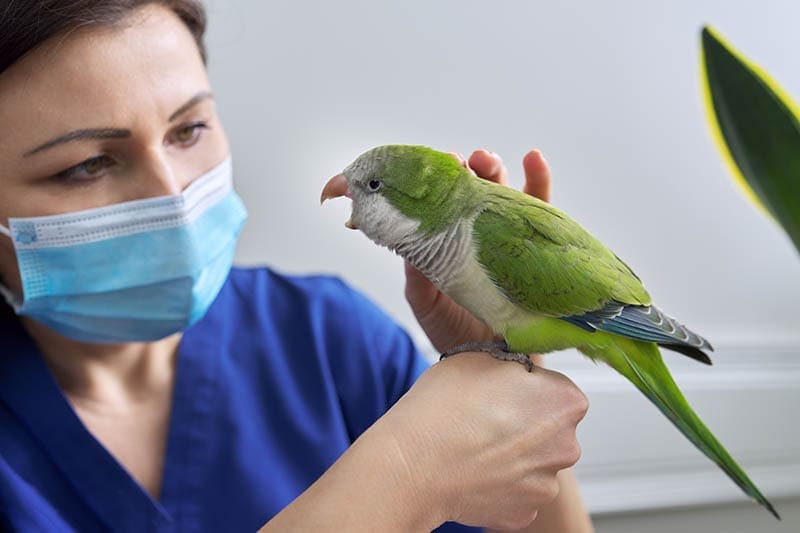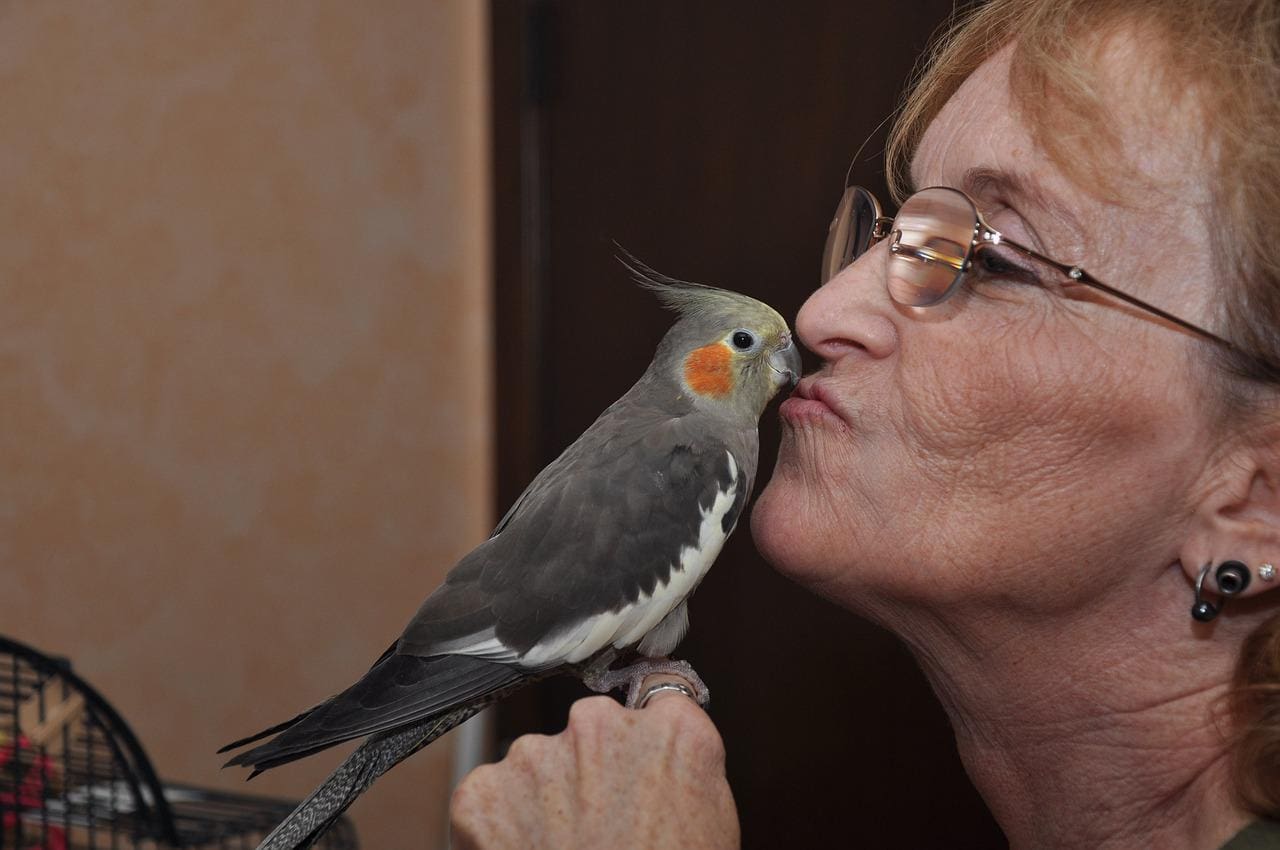Can Parrots Lay Eggs Without Mating? Health Facts & FAQ
Updated on

Click to Skip Ahead
Many first-time bird owners don’t bother finding out the sex of their bird and don’t realize until it happens that female parrots can lay eggs even without a male present. Egg production is an extremely stressful and taxing process and not something your bird should go through unless you’re purposefully breeding her and know what you’re doing.
Read on to learn everything you need to know about egg laying without a mate and how to prevent this from happening.
What Triggers Egg Laying?
Female parrots can lay eggs without mates due to several triggers. Certain things naturally occur during the breeding season in the wild to signify to birds that it’s time to begin mating.
- Warmer temperatures
- Light exposure exceeding a 10-hour cycle
- Access to nesting materials
- Hormone activation
The most likely reason your bird is laying eggs is her hormones. Hormones activate the mating instinct in birds and can trigger them to begin developing eggs.
- Getting petted in certain areas (specifically along the back and on the tail)
- Exposure to longer daylight hours
- Exposure to bird calls
- Exposure to nesting material or sleeping huts
The Dangers of Birds Laying Unfertilized Eggs
Bird-laying does present several complication risks.
Calcium Deficiencies
Developing and laying eggs is incredibly taxing, especially on your bird’s calcium levels. As calcium levels become depleted, it can lead to hypocalcemia. Hypocalcemia can cause signs such as weakness, tremors, and seizures. It may also lead to poor feather quality and brittle bones. Excessive egg-laying can also predispose them to osteoporosis.

Egg Binding
Egg binding occurs when female parrots cannot naturally expel the eggs from her body. It can be resolved easily if detected early; however, critical illness (including an untimely death) may result if an egg-bound bird is left for too long.
Egg binding occurs more often in smaller birds like parakeets, canaries, finches, and lovebirds, though any female bird can become egg-bound.
- Weakness
- Breathing heavily
- Not perching
- Straining
- Abdominal swelling
- Egg bulging from the vent
- Inability to stand
- Inability to fly
- Trouble grasping the perch
Behavioral Problems
While behavioral issues aren’t as serious as calcium deficiencies or egg binding, they can be difficult for a parrot owner to contend with. When parrots lay eggs, their hormones change drastically, and they can become very protective. Your usually friendly parrot will suddenly bite you or squawk at you if you approach her. While this isn’t life-threatening, it can make caring for your bird very difficult.
Frequently Asked Questions (FAQs)
What Do I Do if My Single Parrot Laid an Egg?
Even if your parrot’s eggs are unfertilized, her instincts will still tell her to sit on them. This is fine, but you shouldn’t provide a nesting box or anything that can encourage nesting behaviors.
It is best to purchase dummy eggs (ping pong balls work great for some species), or use something that resembles their eggs and allow her to sit on the eggs; otherwise, she may continue to lay eggs to make up for any you’ve removed. Leave them with her for a typical incubation period, typically around 3 weeks. After that time, you can remove the “eggs” one by one until they’re all gone. Eventually, she will understand that the eggs she laid weren’t viable. Some parrots will even abandon the eggs on their own after some time has passed.
Allowing her to sit on her own infertile eggs is controversial. While they obviously won’t hatch, they may spoil (because they are unviable), and this might pose a health risk for your bird. This is especially true if a novice bird accidentally steps on and breaks an egg while entering or exiting the nest.

How Can I Prevent Egg Laying?
You can do several things to prevent your parrot from laying eggs.
Put Her to Bed Early
A long day is an environmental cue for your bird that it’s breeding time. Allowing your parrot to stay up too late mimics the long spring and summer days, making her think it’s breeding season. Put her to bed earlier and ensure she has complete quiet and darkness for it to be effective.

Don’t Allow Access to Dark or Enclosed Spaces
Many well-meaning parrot owners give their birds sleep or cuddle huts as they believe these are cozy places for their birds to sleep at night. However, parrots can be cavity nesters, meaning they build their nests in dark, enclosed spaces instead of building one out in the open. To prevent your pet from laying eggs, she mustn’t have access to such areas.
Minimize Handling
As hard as it may be, holding and petting your bird less is key to preventing egg laying. Especially minimize stroking or rubbing her on her body as that sends a sexual message to her that she should continue to lay eggs. Touching your parrot should only be limited to her head.
Remove Her “Love” Toys
Single birds sometimes display mating behaviors with their favorite objects in their environment, such as toys, perches, or mirrors. Mating behaviors include vent rubbing and tail lifting. If you ever notice your bird engaging in such behaviors with objects in her cage or around your home, you should permanently remove it from her environment.
Discourage Mating Behavior
Your bird may exhibit mating behaviors with inanimate objects, but she can also engage in such behaviors with you. If she begins vent rubbing, tail lifting, or regurgitating around you, put her back in her cage for a “time out.”

Rearrange or Move Her Cage
Your parrot may be more likely to lay eggs in a cage that she’s familiar with. If you haven’t recently changed the cage’s layout or location in your home, doing so can help discourage egg-laying.
Separate Your Birds
If you have several birds, keeping them separate during the breeding season can discourage egg-laying. Even two female parrots that are kept together can be triggered to lay eggs, so it’s best to keep them apart if possible.
Speak to Your Vet

Some parrots may become chronic egg layers to the point they become debilitated. Birds in such situations must be examined by your avian vet as soon as possible.
They may suggest administering hormone injections to stop egg-laying temporarily. However, this medication typically lasts only a month, and the injections must be repeated for continued effectiveness. For some birds, a single injection provides enough time to recover any depleted calcium stores.
If your parrot’s egg-laying needs to be halted for longer, your vet may suggest a surgical procedure where they place an implant under her skin. The implant contains a hormone that gets slowly released to prevent further egg-laying. It can last up to six months or more.
In severe cases, your vet may recommend an ovariectomy (removal of her ovary). However, it’s important to note that this is often used as a last-ditch effort, as the surgery comes with a significant risk.
Final Thoughts
Parrots can lay eggs with or without a mate present. Unfertilized eggs will not result in baby birds, but they can still present a serious hazard for your pet. Egg laying is a physically exhausting process that can make your parrot very ill, so you should do all you can to prevent hormonal behaviors and triggers that tell your bird it is breeding season. If your parrot exhibits signs of calcium deficiency or you believe she may be egg-bound, a visit to the vet is necessary.
Featured Image Credit: Ansie van Niekerk, Shutterstock












